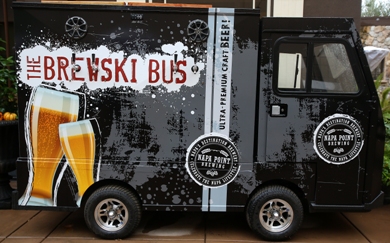One of the interesting things about writing about the beer scene is how little of what we wind up talking about is the technical end of beer – what hops, what water, what yeast and so forth. The best beer stories tend to be about bigger things – the back story, the philosophy of the brewers, the larger trends behind what’s going on.
And that was true of my story this morning about the new Napa Point Brewing in Napa, which says it is bringing a more polished and professional edge to the normally shaggy, DIY world of craft brew. I tasted the beer, of course, and it is in fact quite good. Brewer Denise Jones was behind many of the beers at her previous employers, Moylans and Third Street Aleworks, and like those breweries, Napa Point offers well balanced and precise beers. Nothing wild or extreme, but consistent, well-crafted and drinkable.
But some explanation is probably in order of this “ultra-premium” thing that founder Robert Dahl was talking about. Unfortunately I didn’t have a lot of space to get into it. Robert’s explanation goes like this: “To make great beer, you’ve got to have a great brewmaster. To make great beer, you’ve got to have great equipment. To make great beer you’ve got to have great water. And to make great beer, you’ve got to have great ingredients.” He won’t say how much he spent to get those things, but he admitted that it is a lot: “I’ve bet my kids’ future on this. This is millions.”
One of the interesting features that Dahl has invested in is a complicated water treatment system, which will allow Jones to strip tapwater, in this case from American Canyon’s municipal system, down to its pure state and rebuild it by hand to create water that matches traditional styles – softer water for central European Pilsners, for example, and harder water for English-style pale ales. Each beer has its own unique custom-built water chemistry.
“Ultra-premium” is more than just than just ingredients, however. In his view, the term also includes the experience. So he offers a good looking restaurant, an outdoor beer garden, a comfy tasting room. When his brewhouse is finished, he’ll offer guided tours. The brewhouse also has a glassed in walkway along the side so customers can walk around the edge of the brewhouse, the way tourists do at the Jelly Belly Factory down in Fairfield. The bottled versions of the beer will come only in 750 ml wine-style bottles, to encourage sharing, like a great bottle of wine shared among friends.
“Make good beer and they will come,” he told me, “but to get them engaged and keep them coming back, you’ve got to create those other experiences.”
The part of our interview that I found most interesting, however, was about the business behind brewing. Robert is clearly passionate about beer and reasonably knowledgable about the brewing process, but he freely admits that he is not a brewer, or even a homebrewer. He’s not even really a wine guy, despite the fact that he has built several sucessful wine-oriented businesses. Rather, he seems to be a businessman first and foremost. In a sense, he could be producing shoes or bricks or any other less sexy product. It just happens that he loves beer and wants to make that his product.
It’s worth quoting at length what he had to say. It seems to me that in his comment lies the heart of what Napa Point is about:
“I wouldn’t consider myself a winery guy. I’m an entrepreneur. I love the art of business. As much as brewing is an art and as much as winemaking is an art … not everyone can do it. I love the entrepreneurial aspects that business brings. I love the challenges – every single day you have a new challenge … how do you fix that problem? How do you make sure it doesn’ t happen again? How do you build a team of all these moving parts. As a brewer, you’re focused on one little thing. I’ve got to focus to make sure [Brewmaster Denise Jones] is doing her job, she doesn’t need anything, that she’s got the tools, both the physical and mental tools. The same thing with your whole, entire staff. To me that’s [what] I am passionate about. I love being the maestro of all these different moving parts and then being able to intercede in this for a little bit and then jumping in on that for a little bit. That’s what drives me, I love that aspect.”
Most sucessful brewers eventually come around to this realization, but some later rather than sooner. Lagunitas founder Tony Magee, for example, readily admits that he had no idea how to run a business when he started in 1993 and had to learn on the fly. “They say good judgment is born of bad experience,” he told me back in April when I asked him about how he came to be at the head of the fastest-growing brewery around.
He compared the first two decades of the brewery as “being chased down the street by a pack of dogs.” I asked him whether the pressures of running a multi-million dollar business ever bother him.
“It was a much bigger thing when we were 30 employees and everyone was right there next to you,” he said. “I was the last person to go on payroll – there were 20 people on payroll before I started. That was just because their checks needed to clear the bank; it was my problem to figure out how to pay my bills; it wasn’t their problem to make sure my bills got paid. Now it’s a lot easier.”
Now, he said, the business is “very liquid. We’re not driven to the lesser of bad options anymore. We’re making choices between good options.”
Richard Norgrove, CEO of Bear Republic, took a more organized approach to business when he and his son founded the brewery in 1995. At the recent Sonoma County Beer, Cider and Wine Conference, put on by the Economic Development Board, Norgrove shoved aside the romance and glamor of the brewing industry and offered a message similar to what Robert Dahl is preaching: get your business fundamentals down or there’s no point in founding a business.
Norgrove said he hangs the company’s business license in his office.
“I look at that business license evey single day,” he said. “You know what it doesn’t say? Non-profit. I have to make money … there is no such thing as a loss-leader. Every single aspect of your business has to be profitable.”
Both Lagunitas and Bear Republic, however, have colorful back stories to sell to the consumer along with their great beers. In Tony’s case, it is the story of a pot-smoking musician who caught the beer bug and rode a crazy wave to sucess. For Bear Republic, it’s the father-son family dynamic of the brewery, combined with the distinctive car racing theme.
It’s clear that the founders of Napa Point have all the physical stuff they need to suceed – high-quality ingredients, first class equipment, a great location and facility. What will be interesting to watch is whether Napa Point can combine the artistry of Jones with the business acumen of Dahl and come up with some kind of narrative to sell along with the beer. So far, the brewery has publicized itself mostly on the “ultra-premium” concept, which is an unusual turn of phrase in the brew industry and is likely to strike the ears of seasoned beer geeks as a little strange.
In our interview back in April, I asked Tony Magee about the importance of a story and he said it is key to a brewery’s success. The lack of a compelling story, he said, is what is killing the big mass market brewers.
Consumers would stick with mass market beer, he said, “if a big brewery tasted like ours and has the same kind of soulful story – because remember, we’re not really in the beer business, we’re in the story telling business. Consumers want a soulful story, something they can believe in. It’s not a two dimensional thing, it’s not a glass full of liquid. The third and fourth dimensions are there: It’s time and experience and things they have heard.”
When we sat down earlier this week, I asked Robert Dahl what story he wants to tell.
“I think our story is just the entrepreneurial American success story,” he said after considering it for a moment. “You have a passion about something, you believe in something and you do it. Either live your dream or watch someone else live it. I don’t want to watch someone else live my dream – I want to live it.”
– Sean Scully


 buyer at Fircrest Market in Sebastopol and the administrator of the NorCal Beer Geeks group on Facebook.
buyer at Fircrest Market in Sebastopol and the administrator of the NorCal Beer Geeks group on Facebook.